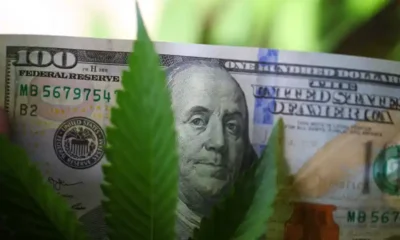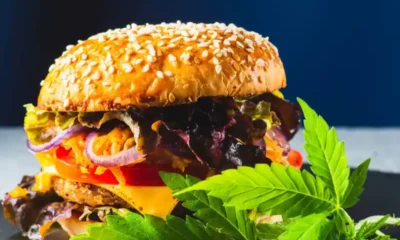Connect with us
Published
3 years agoon

Researchers continue to look into the benefits of psychedelics and psilocybin, the naturally occurring compound found in some mushrooms (notably, “magic” mushrooms), and how they can work to improve mental health treatments. While we are still learning how these substances interact with the brain, we may have just learned a little bit more.
A new study from Yale shows that a single dose of psilocybin given to mice prompted an immediate, long-lasting increase in connections between neurons. The findings were published July 5 in the journal Neuron.
Yale’s Alex Kwan, an associate professor of psychiatry and neuroscience and the senior author of the paper, elaborated on the results.
“We not only saw a 10 percent increase in the number of neuronal connections, but also they were on average about 10 percent larger, so the connections were stronger as well,” Kwan said.
There have been a multitude of studies and lab experiments looking to show the promise of psilocybin, alongside the anesthetic ketamine, in regard to decreasing depression specifically. New research from Yale found that these compounds increase the density of dendritic spines, which are small protrusions on the nerve cells that aid in the transmission of information between neurons.
Chronic stress and depression can reduce the number of these neuronal connections, so the findings that these substances can help to restore them are crucial in treatment.
Kwan and first author Ling-Xiao Shao, a postdoctoral associate at the Yale School of Medicine, used a laser-scanning microscope, which was able to image the dendritic spines in high resolution and allowed the scientists to track them over multiple days in living mice. They found increases in the number of dendritic spines and their size within 24 hours of administering the psilocybin.
The Yale scientists also observed that the changes were still present a month later, and the mice subjected to stress showed behavioral improvements, alongside increased neurotransmitter activity after being dosed with psilocybin.
Psilocybin is the compound that helps to produce the “magical” experience often associated with ingesting psychedelic mushrooms. It’s often been used as a spiritual substance, and Kwan said that it may be those psychological effects that allow growth of neuronal connections.
“It was a real surprise to see such enduring changes from just one dose of psilocybin,” Kwan said. “These new connections may be the structural changes the brain uses to store new experiences.”
Psilocybin has also been at the forefront of new drug decriminalization movements, as Denver, Colorado became the first city to decriminalize psilocybin mushrooms in 2019. Cities like Santa Cruz, California followed suit, and Oregon became the first U.S. state last year to both decriminalize psilocybin and also legalize it for therapeutic use.
Oregon’s program will not be up and running until 2021, and the Oregon Psilocybin Advisory Board is still learning about the safety and efficacy of psilocybin in treating conditions and how to best structure the program.
André Ourso, administrator of the Center for Health Protection at Oregon Health Authority, told Oregon Public Broadcasting that a lot of the preparation for the program comes with reviewing research and current medical findings around psilocybin.
“Some of the questions that we’re looking at is what is psilocybin good for, basically?” Ourso posed. “What are the safety issues around the use of psilocybin? What is it effective for? We know that we’ve seen some research recently that shows that it has some real promise in treating Major Depressive Disorder, that it can treat addiction, and can treat anxiety associated with terminal illness. So, the research is really going to uncover what the science tells us about the effectiveness and safety of this type of therapy.”
As legislation continues to open up in regard to research, psilocybin is being considered as a treatment for other mental health disorders, like PTSD. There have also been studies on psilocybin’s impact on treating anxiety, pain, and addiction.
Many predict that psilocybin will slowly begin to follow a similar path of cannabis, in that, over time, more regions will decriminalize the substance, legalize medical research, and open up more knowledge around its benefits and potential means of treatment. Right now, many experts still do not know the specific effects psilocybin has on the brain, though research like that of Yale’s gives us more answers than we’ve ever had before.


You Don’t Understand the Difference Between Decriminalizing and Legalizing, Do You?


North Dakota Committee Files Ballot Measure To Legalize Adult-Use Cannabis


California County Mulls Reduction To Cannabis Cultivation Tax


Cheech and Chong Become Newest Operators in Call of Duty


Manage Your Munchies: This Year’s Top 420 Meal Deals


New York Cannabis Control Board Approves 101 New Adult-Use Licenses
